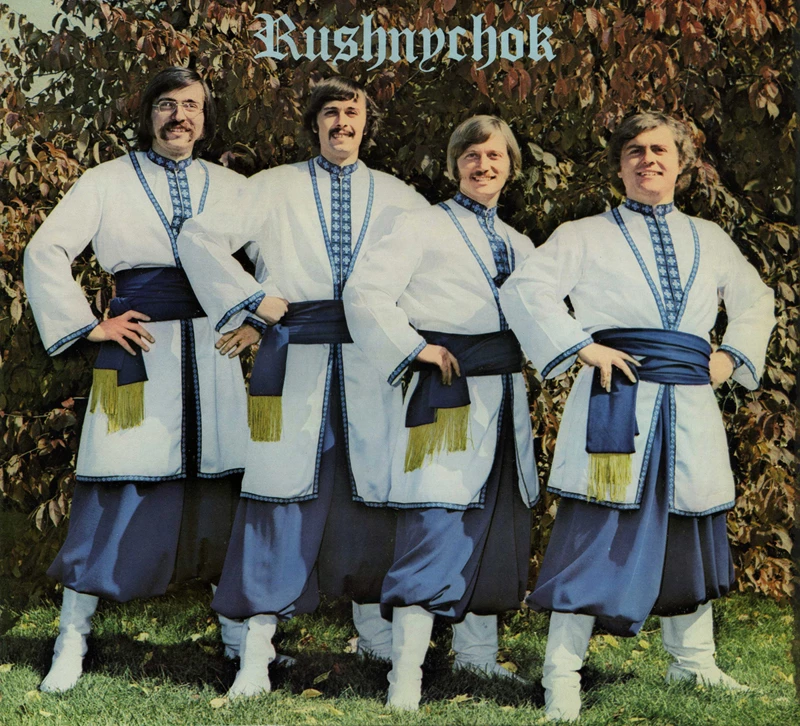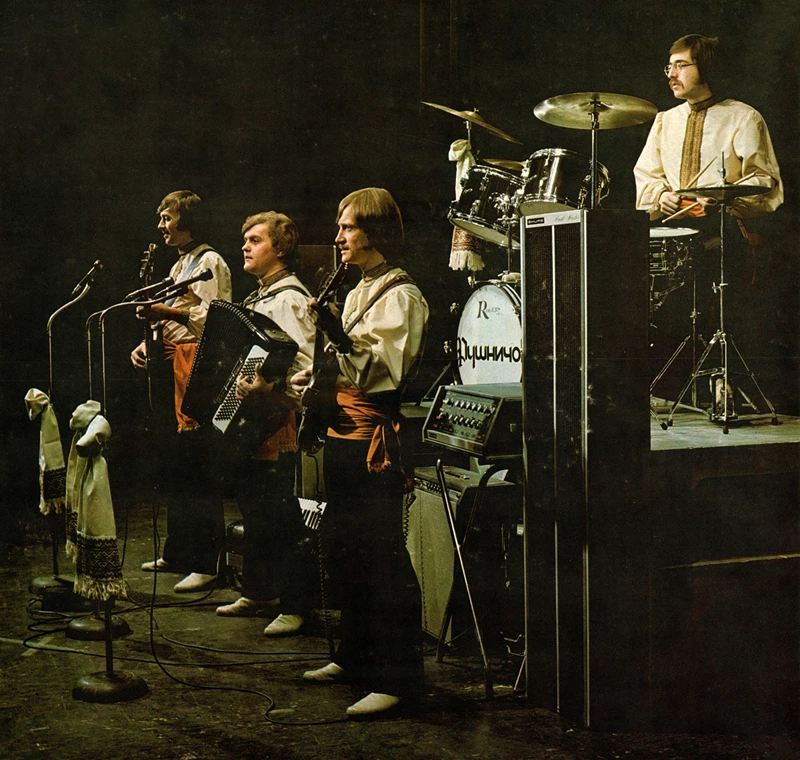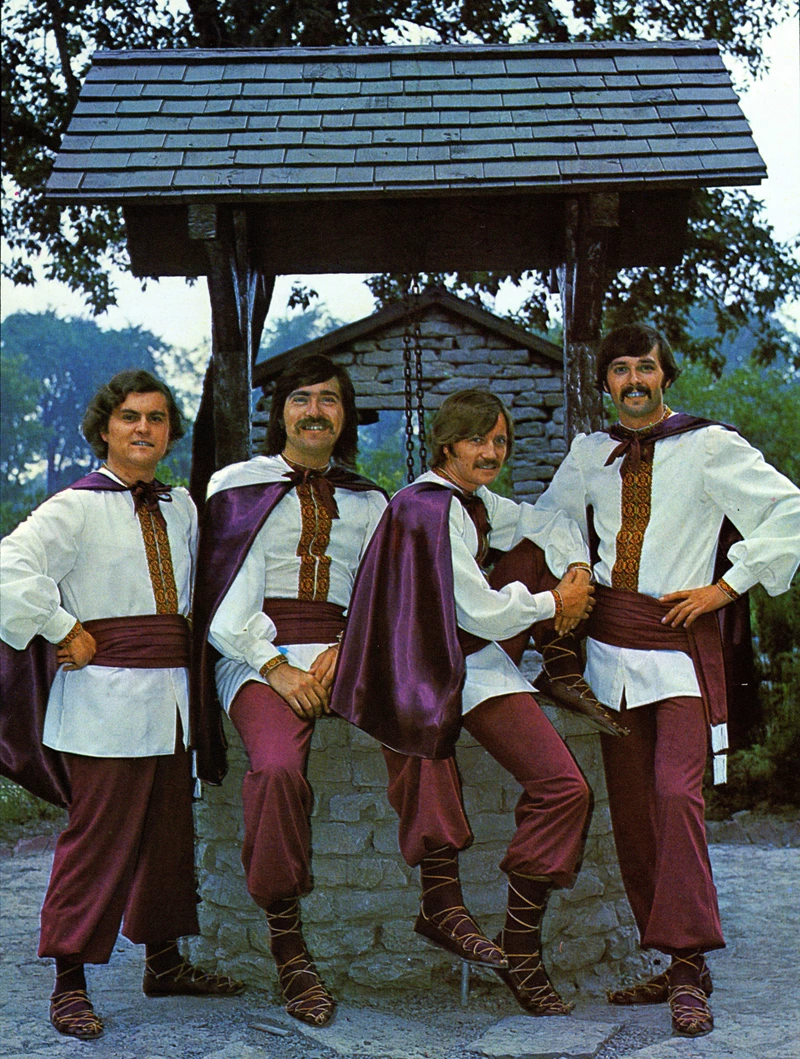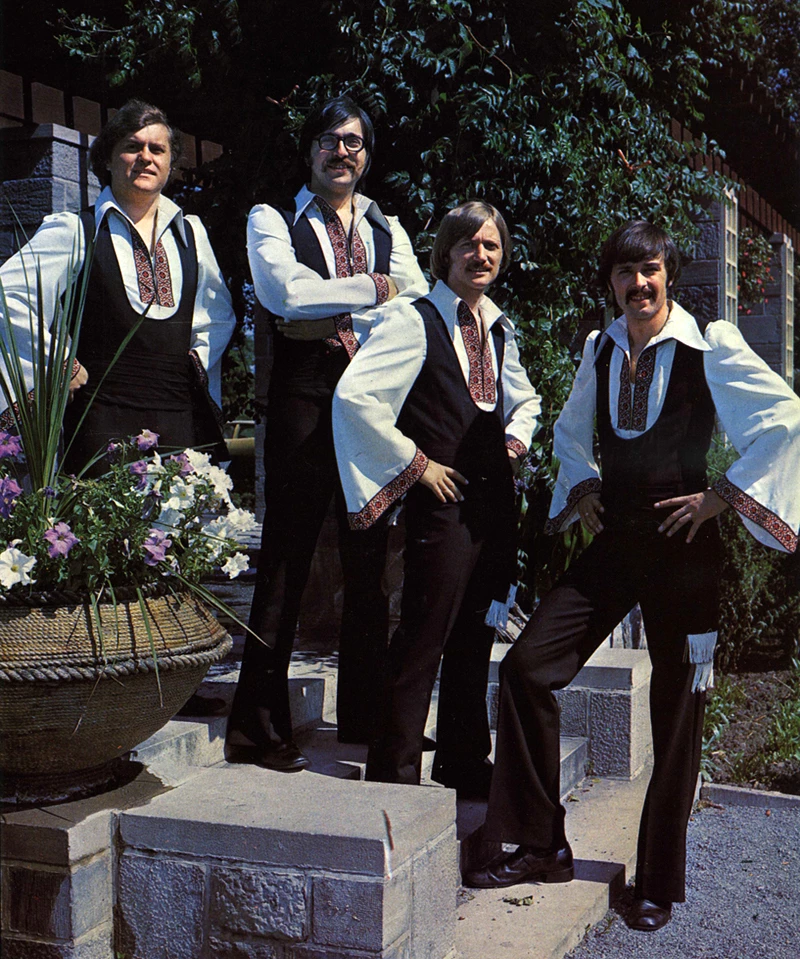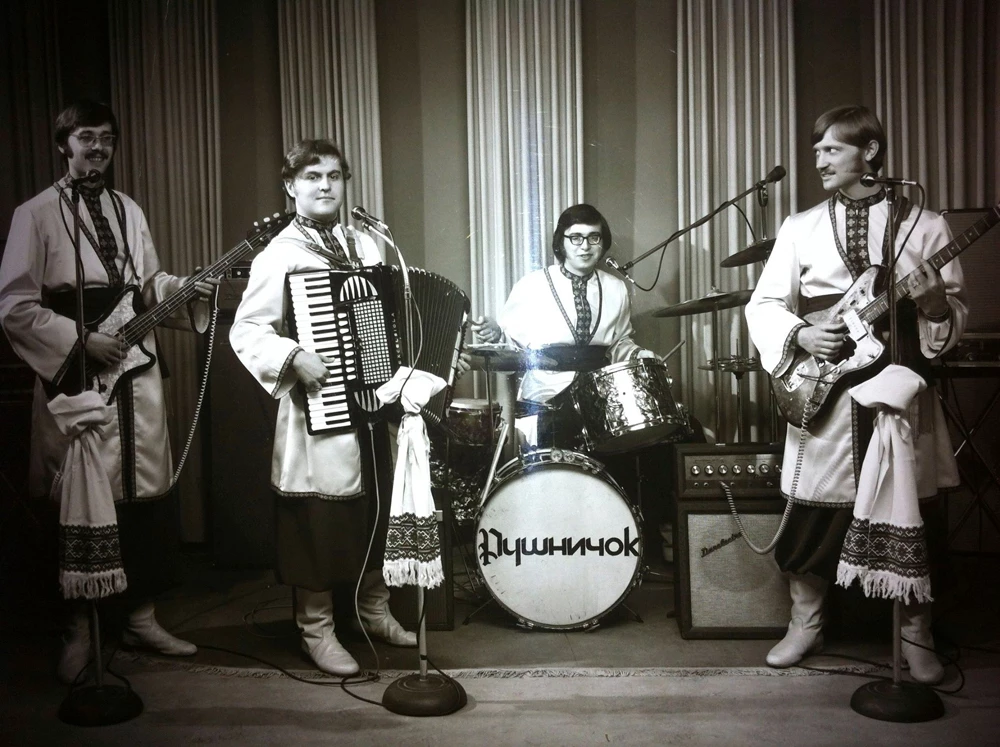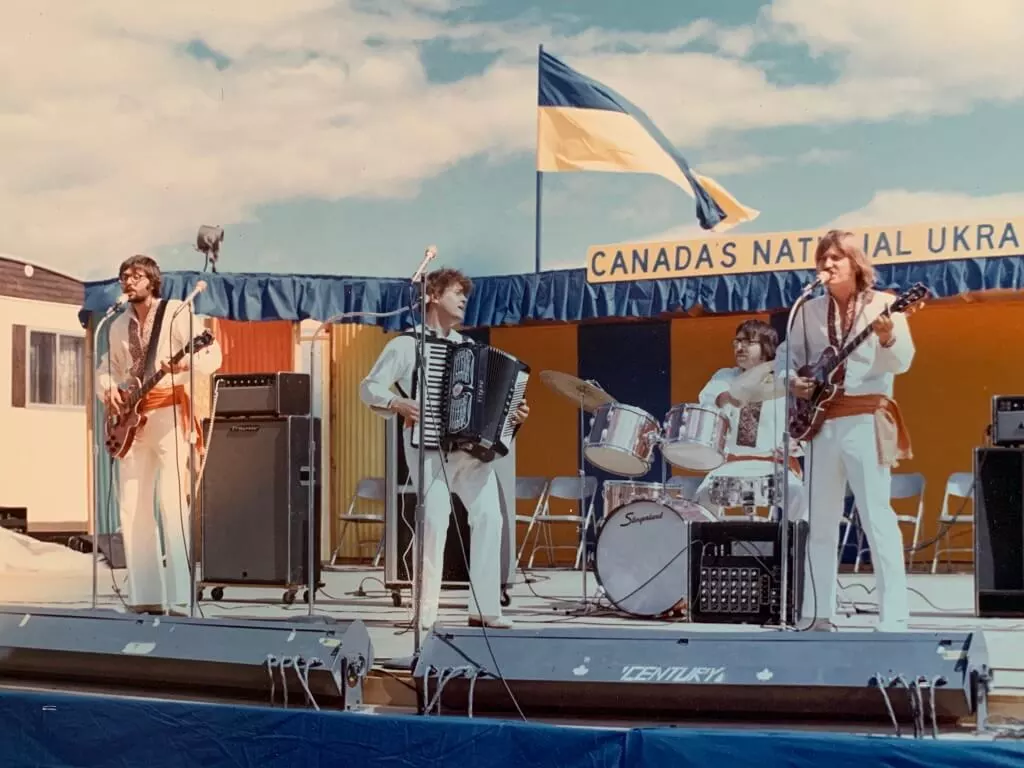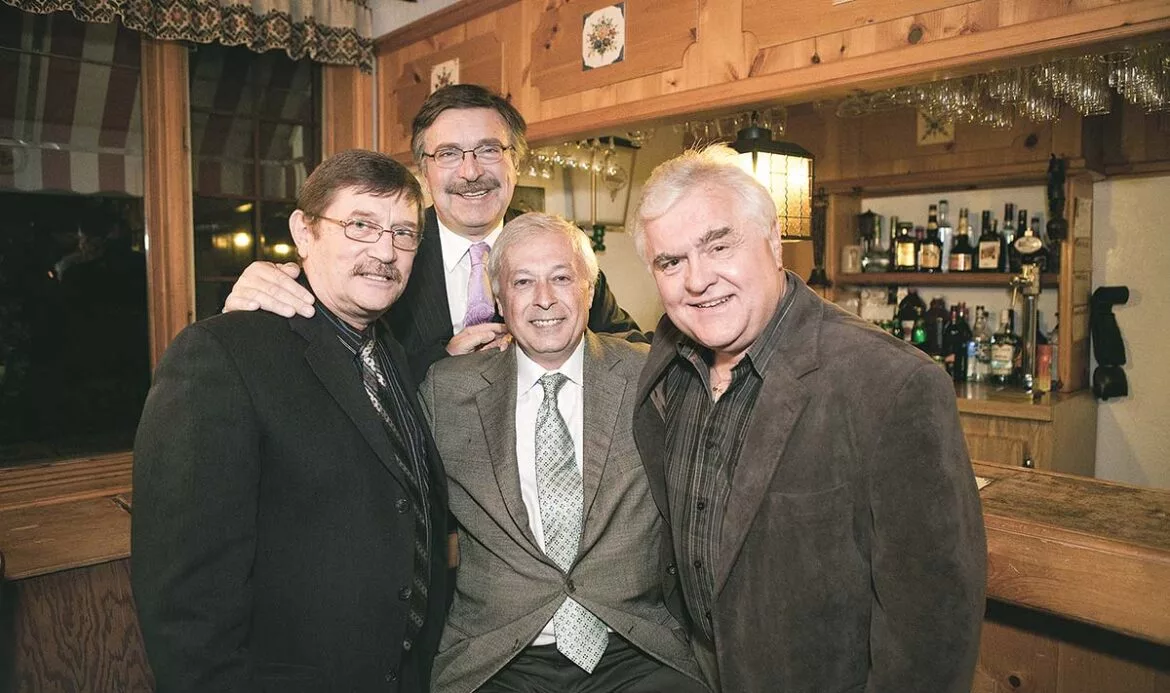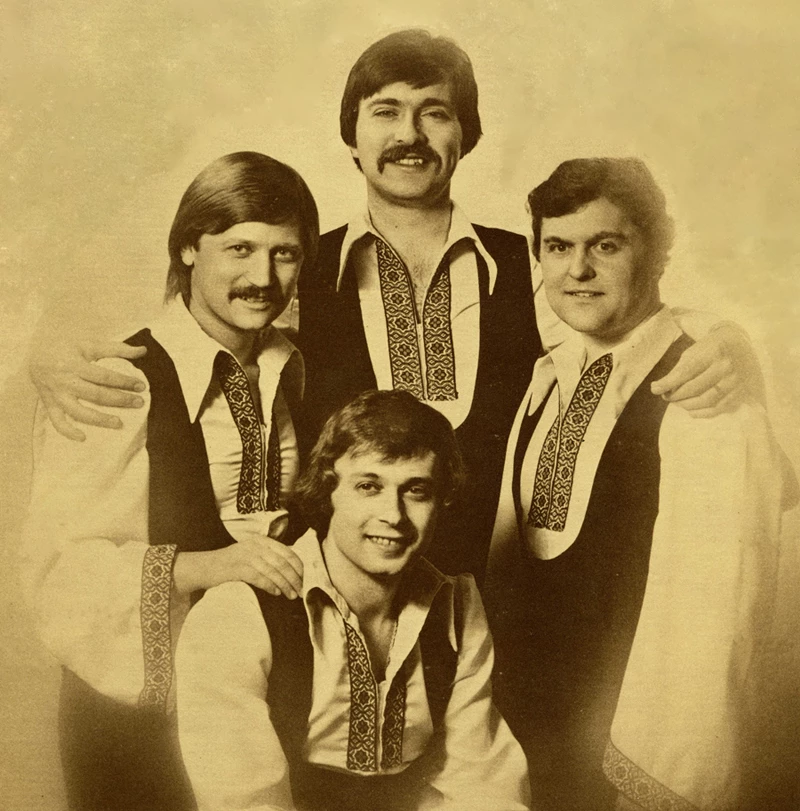
Ансамбль «Рушничок»
Ансамбль «Рушничок» (Монреаль, Канада) – один із найяскравіших та найпопулярніших українських музичних ансамблів з Канади. В репертуарі ансамблю – українські народні пісні, пісні українських авторів та власні твори.
Склад ансамблю:
• Андрій Гарасимович (Andrij Harasymowycz) – гітара, вокал
• Юрій Штик (Yurko Sztyk) – бас-гітара, вокал
• Степан Андрусяк (Steve (Stepan) Andrusiak) – барабани, вокал
• Євген Осідач (Eugene Osidacz) – акордеон, вокал
У грудні 1969 року в місті Монреалі (Канада) нащадки українських емігрантів, на той час студенти місцевих вузів: Андрій Гарасимович, Юрій Штик, Євген Осідач та Степан Андрусяк, спонтанно організували ансамбль, який через кілька років стане найпопулярнішим українським ансамблем в усій Північній Америці. Така популярність ансамблю була зумовлена рядом факторів. Основними з яких були: талант музикантів, сприйняття ними нових музичних тенденцій, використання тогочасних досягнень у музичній техніці та вдала презентація ансамблю перед аудиторією, а також запит цієї аудиторії на новий музичний продукт.
Становлення ансамблю припало на роки стрімкого розвитку та популярності на північноамериканському континенті музики фольк-рокового напряму. Відбувались і зміни в музичному інструментарії та музичній техніці, бас-гітара і барабани стали необхідністю, тому що ритмічна сторона музики стала такою ж важливою, як і мелодійний аспект. Необхідністю стали і більш потужні підсилювачі звуку. Молоді талановиті музиканти враховували ці тенденції та вдало поєднували їх з традиціями української музики, внаслідок чого виробили власний виконавський стиль, в якому захоплювало чудове виконання українських пісень у чотири голоси під музичний супровід з елементами фольк-року. Фактично ансамбль став основоположником такого роду української музики у Північній Америці.
Також, важливою складовою успіху ансамблю була його презентація перед аудиторією. Музиканти позиціонували себе не просто як ансамбль, що виконує українську музику, а як ансамбль, який по духу є українським. Все це відображалось у відповідних зовнішніх проявах: музиканти виступали на сценах оформлених традиційною українською атрибутикою, у стилізованих українських костюмах, які по кілька разів змінювались за час концерту, особливо гарно сприймались публікою перев’язані вишитими рушниками стійки мікрофонів на час виступу.
Перший виступ ансамблю відбувся у грудні 1969 року напередодні Нового року на танцях, далі музиканти грали на весіллях, вечірках, та інших забавах в Монреалі та його околицях. Загальне визнання ансамбль здобув після виступу на одному із заходів української громади в столиці Канади. Після цього успіху «Рушничок» запрошують на Канадсько-Український національний фестиваль (1972) в Давфін (провінція Манітоба), на Союзівку (1973) в Кергонксоні (Kerhonkson, штат Нью Йорк, США), на мистецький фестиваль «Garden State Arts Festival» (1974) в Голмделі (Holmdel, штат Нью Джерсі, США) та ряд інших музичних фестивалів по всій Північній Америці.
У 1973 році видано першу платівку з записами пісень у виконанні ансамблю. Платівка мала феноменальний успіх. Кілька років поспіль ця платівка була на першому місці за кількістю проданих копій з поміж інших альбомів української музики. Наступні платівки ансамблю видані у 1974 (Volume Two), 1976 (Volume Three), 1977 (Volume Four), 1980 (Volume Five) також мали гарний успіх.
«Рушничок» побував з концертами у більшості міст Канади та США де проживала українська громада, виступав на численних фестивалях та заходах по всьому північноамериканському континенті. Записи пісень у виконанні «Рушничка» слухали в багатьох країнах світу, потрапляли ці пісні і на Україну.
У 80-х роках «Рушничок» припиняє активну концертну діяльність, музиканти збираються тільки для виступів на окремих концертах.
Творчість «Рушничка» мала величезний вплив на розвиток української музичної культури у Північній Америці. Ансамбль фактично започаткував новий зразок музичного мистецтва української діаспори, та став прикладом для численних українських ансамблів, які з’являлись у Північній Америці у 70-х роках.
Література:
1. «Top entertainers, bands featured at Soyuzivka». The Ukrainian Weekly / july 14, 1973, №131, с.: 1, 3.
2. «Dauphin awaits thousands for festival». The Ukrainian Weekly / july 14, 1973, №131, с.: 1, 4.
3. «“Rnshnychok” : The first 10 years». The Ukrainian Weekly / february 17, 1980, №39, с. – 11.
4. «Ukrainian band and their development in the United States and in Canada from 1959 to the present». The Ukrainian Weekly / february 24, 1980, №44, с. – 10.
5. Brian A. Cherwick . Polkas on the Prairies: Ukrainian Music and the Construction of Identity. Edmonton, Alberta, Spring 1999, с. – 111-119.
_____
Ансамбль «Рушничок» | «Rushnychok» ensemble | Orchetra «Rushnychok» | Оркестра «Рушничок» | Квартет «Рушничок» | «Rushnychok» quartet | «Rushnychok» band
Примітки до галереї:
06. Rushnychok on stage at Canada’s National Ukrainian Festival in Dauphin, Manitoba, in 1973. From left are: Yourko Sztyk (bass guitar), Ewhen Osidacz (accordion), Stefan Andrusiak (drums) and Andrij Harasymowycz (lead guitar).
08. In 2010, at an anniversary party (from left) are Andrij Harasymowycz, Stefan Andrusiak, Yourko Sztyk and Ewhen Osidacz.
Джерело: 01 – 04, 07 – світлини з поліграфії альбомів ансамблю; 05 – з архіву Степана Андрусяка; 06, 08 – ukrweekly.com (ілюстрації до статті «Reflections on Rushnychok at 50»).
